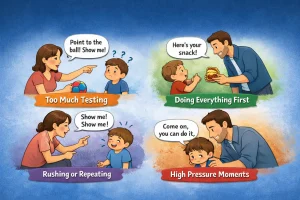Overcoming Pronunciation Challenges in Adults
By Rajini D
Last Updated: June 10, 2025
Have you ever felt frustrated because someone couldn’t understand you, despite your best efforts to speak clearly? You’re not alone. Pronunciation challenges in adults are more common than you might think. These challenges can range from slight mispronunciations to more significant issues that impact everyday communication. Whether you’re trying to speak confidently in a meeting or simply have a conversation with friends, clear speech is crucial.
Pronunciation issues can arise for various reasons, including learning a new language, regional accents, or even conditions like speech sound disorders. Regardless of the cause, these difficulties can affect your self-confidence and ability to connect with others.
Improve Your Speech Online
Overcome speech challenges and build your voice with expert online therapy. Regain clarity, fluency, and communication strength.
What is Pronunciation?
Pronunciation is the way we produce the sounds of a language to communicate clearly. It’s more than just saying words correctly; it’s about ensuring that others can understand what we’re saying. Key components of pronunciation include articulation, tone, stress, and intelligibility.
- Articulation refers to how we move our mouth, lips, tongue, and other speech organs to create sounds. For instance, the difference between the sounds /s/ and /sh/ comes down to subtle movements in these organs.
- Tone is about the pitch and intonation we use when speaking. It can change the meaning of a word or sentence, like when we ask a question or make a statement.
- Stress involves emphasizing certain syllables or words more than others. In English, for example, we say “REcord” as a noun but “reCORD” as a verb, depending on where the stress falls.
- Intelligibility is how clear and understandable our speech is to others. Good pronunciation helps ensure that listeners can easily grasp what we’re saying.
Understanding Speech Sound Disorders
Speech sound disorders, also known as misarticulation, occur when a person has difficulty producing sounds correctly. These issues can be subtle or more pronounced, affecting how clearly and accurately someone speaks. For adults, these disorders may manifest in various ways, often influencing everyday communication.
One common type of speech sound disorder involves placement errors. This occurs when the articulators, like the tongue, lips, or jaw, are not positioned correctly to produce a particular sound. For instance, if someone misplaces their tongue while trying to pronounce the /f/ sound, it might come out as /p/ or /b/. This subtle misplacement can change the meaning of words and lead to misunderstandings.
Another aspect of speech sound disorders includes tone issues. Tone refers to the pitch and quality of the voice used during speech. In some cases, adults might struggle with maintaining the correct tone, which can affect how their speech is perceived. For example, an intended statement might unintentionally sound like a question if the tone rises at the end of the sentence.
These disorders can arise from various causes, including learning habits from childhood, neurological conditions, or even lack of exposure to proper pronunciation in a second language. Addressing these issues often requires a combination of self-awareness and professional intervention.
Also Read: Speech Sound Disorders: Causes, Treatment and Strategies
Causes of Pronunciation Challenges in Adults
Pronunciation challenges in adults can arise from various factors, each influencing speech clarity and intelligibility. Understanding these causes can help in addressing and overcoming these challenges effectively. Let’s explore some common causes:
Mislearning Speech Sounds
One of the most common causes of pronunciation challenges is mislearning speech sounds during childhood. If incorrect speech patterns are learned early on and not corrected, they can persist into adulthood. For example, a person might consistently mispronounce the /r/ sound, replacing it with a /w/ sound, resulting in words like “rabbit” being pronounced as “wabbit.” This type of issue often requires targeted speech therapy to retrain proper articulation.
Non-Native Language Speakers
For adults learning a new language, pronunciation can be particularly challenging. The sounds and patterns of a non-native language, such as English, may be significantly different from those in one’s native language. This can lead to difficulties in producing certain sounds correctly, resulting in an accent or mispronunciations. For instance, many non-native English speakers might struggle with the th sound, substituting it with /t/ or /d/.
Know more: Breaking Down Natural Language Acquisition for Beginners
Accent and Dialect Variations
Even among native speakers, pronunciation can vary widely due to regional accents and dialects. For example, Australian English differs in pronunciation from British English, which can lead to misunderstandings in communication. These variations are natural and part of the linguistic diversity, but they can sometimes cause confusion, especially in formal settings or public speaking.
Neuromotor Speech Disorders
Conditions like dysarthria and motor aphasias can affect the muscles used in speech, leading to unclear pronunciation. Dysarthria, for example, involves weak or uncoordinated muscles, which can make it difficult to form words correctly. Motor aphasias can disrupt the brain’s ability to plan and coordinate the movements necessary for speech. These conditions often require specialized treatment and therapy.
Other Factors
Several other factors can impact speech clarity, including hearing loss, dental issues, and even psychological factors like anxiety. For example, a person with hearing loss might not be able to hear themselves clearly, leading to mispronunciations. Anxiety can also affect speech, causing someone to speak too quickly or mumble, making their words hard to understand.
Impact of Pronunciation Difficulties
Pronunciation difficulties in adults can significantly impact various aspects of daily life. These challenges extend beyond simple communication issues, affecting personal confidence, professional opportunities, and social interactions. Let’s explore these impacts in more detail:
Communication Barriers
One of the most immediate effects of pronunciation difficulties is the struggle to be understood by others. Mispronunciations can lead to confusion or misunderstanding, making conversations frustrating for both the speaker and the listener. For instance, mixing up sounds like /s/ and /sh/ can change the meaning of words, causing unintended confusion. This barrier can be particularly challenging in settings where clear communication is crucial, such as in the workplace or during public speaking.
Also read: Speech Therapy: Improve Communication in Adults
Self-Confidence Issues
Pronunciation problems often lead to self-confidence issues. When adults struggle with clear speech, they may feel self-conscious or embarrassed, especially in social or professional situations. This lack of confidence can deter them from speaking up in group settings, participating in discussions, or expressing themselves fully. Over time, these feelings can contribute to a negative self-image and social withdrawal.
Professional Challenges
In the professional realm, clear and effective communication is key to career success. Pronunciation difficulties can hinder an individual’s ability to convey ideas clearly, participate in meetings, or present information confidently. This can impact job performance, limit career advancement opportunities, and even affect the outcome of job interviews. Employers may perceive pronunciation issues as a lack of clarity or professionalism, which can be unfair but is often a reality in competitive job markets.
Academic and Social Impact
Beyond the workplace, pronunciation challenges can also affect academic performance and social interactions. In educational settings, clear communication is essential for participating in class, giving presentations, and engaging in group work. Students with pronunciation difficulties may struggle with these tasks, potentially impacting their grades and overall educational experience.
Socially, these challenges can make it difficult to form and maintain relationships. Misunderstandings or the fear of being misunderstood may lead individuals to avoid social situations altogether, limiting their opportunities for social growth and connection.
Treatment Options and Solutions
Overcoming pronunciation challenges in adults often involves a combination of professional guidance and self-help strategies. Understanding the available treatment options and practical solutions can empower you to improve your speech clarity.
Speech Therapy
The Role of Speech-Language Therapists
Speech-Language Therapists are trained professionals who specialize in diagnosing and treating speech and language disorders. They play a crucial role in helping adults overcome pronunciation difficulties. These therapists assess an individual’s speech patterns to identify specific issues, such as articulation errors or tone problems. They then create personalized treatment plans tailored to address these challenges.
Assessment and Treatment Process
The process typically begins with a comprehensive assessment, where the therapist evaluates various aspects of the individual’s speech. This includes identifying which sounds are difficult, understanding any underlying causes, and gauging the impact on communication. Based on this assessment, a baseline is established to measure progress over time.
Treatment often involves targeted exercises and activities designed to improve specific speech sounds and overall intelligibility. For example, a therapist may use articulation exercises to help a client correctly produce the /s/ or /r/ sounds. Progress is monitored regularly, with adjustments to the treatment plan as needed to ensure continuous improvement.
Self-Help Tips
For those looking to work on their pronunciation independently, several self-help strategies can be highly effective:
- Recording and Playback
- One useful technique is recording yourself speaking and then listening to the playback. This allows you to hear your pronunciation and identify any errors. By recognizing these mistakes, you can focus on correcting them.
- Shadowing and Practice
- Shadowing involves listening to a native speaker and then trying to replicate their speech. This method helps in matching pronunciation, rhythm, and intonation. Practicing phrases repeatedly can help in internalizing the correct way to pronounce words.
- Slow Speaking
- Speaking slowly can significantly improve clarity. It gives you more time to articulate each sound correctly and reduces the likelihood of slurring or mispronouncing words. It’s a simple yet effective way to enhance your communication.
- Stress and Emphasis
- Pay attention to the stress and emphasis in words and sentences. In English, stressing the wrong syllable can change the meaning of a word. Practicing with a focus on stress patterns can make your speech more natural and understandable.
- Using Tools
- Utilize tools like mirrors to watch your mouth movements while speaking. This can help you adjust the placement of your tongue and lips for better articulation. Additionally, using a speech buddy—someone who can provide feedback—or dictionaries to learn the correct pronunciation of new words can be beneficial.
Self-Help Tips and Tools for Pronunciation Improvement
| Tip | Description | Tools |
|---|---|---|
| Recording and Playback | Record yourself speaking and listen to the playback to identify pronunciation errors and areas for improvement. This helps in self-awareness and tracking progress. | Smartphone, audio recorder |
| Shadowing and Practice | Listen to native speakers and try to mimic their pronunciation, intonation, and rhythm. This helps in learning the correct pronunciation and natural flow of speech. | Podcasts, videos, language learning apps |
| Slow Speaking | Deliberately slow down your speech to ensure clear articulation and prevent slurring or mumbling. This helps in focusing on correct pronunciation of each sound. | N/A |
| Stress and Emphasis | Pay attention to stressing the correct syllables and emphasizing key words in sentences. This can improve clarity and make speech more engaging. | N/A |
| Using Tools | Use mirrors to observe and adjust mouth movements, dictionaries to check correct pronunciation, and speech buddies for feedback and practice. | Mirror, dictionary, pronunciation apps |
Conclusion
Pronunciation challenges can affect many areas of life, including daily conversations, work, and social interactions. It’s important to address these challenges to improve communication and boost self-confidence. By understanding the reasons behind pronunciation difficulties, you can begin to make positive changes. Simple steps like practicing regularly and focusing on specific sounds can make a big difference. Remember, progress comes with time and effort, so stay patient and keep practicing.
For those who need extra support, professional speech therapy can be very helpful. At Wellness Hub, our team of experienced Speech-Language Therapists offers personalized treatment plans to help you improve your speech. Whether you choose to work on your own or with a professional, taking steps to overcome pronunciation challenges can lead to clearer communication and more confidence. Start your journey today and see the positive impact that better pronunciation can have on your life.
Frequently Asked Questions:
1. What are common causes of pronunciation challenges in adults?
Common causes include mislearning speech sounds from childhood, being a non-native speaker, accent and dialect variations, and neuromotor speech disorders such as dysarthria and motor aphasias. Other factors like hearing loss and anxiety can also impact pronunciation.
2. How can I improve my pronunciation as an adult?
Improving pronunciation involves regular practice, recording and listening to yourself, shadowing native speakers, speaking slowly and clearly, and focusing on stress and emphasis in words. Professional speech therapy can provide targeted exercises and personalized guidance.
3. What is a speech sound disorder?
A speech sound disorder, or misarticulation, occurs when a person has difficulty producing sounds correctly. This can include issues with articulation, tone, and stress, affecting how clearly someone speaks.
4. How does speech therapy help with pronunciation challenges?
Speech therapy involves a comprehensive assessment of speech patterns and personalized treatment plans. Therapists provide exercises and activities to improve specific sounds and overall intelligibility, monitoring progress and adjusting the plan as needed.
5. Can non-native speakers overcome pronunciation challenges?
Yes, non-native speakers can improve their pronunciation through regular practice, focusing on problematic sounds, and seeking professional help. Techniques like shadowing native speakers and using pronunciation tools can also be effective.
6. Why is pronunciation important in professional settings?
Clear pronunciation is crucial in professional settings for effective communication, participation in meetings, presentations, and job interviews. Poor pronunciation can impact job performance and career advancement opportunities.
7. What are some self-help tips for improving pronunciation?
Self-help tips include recording and playback to identify errors, shadowing native speakers, practicing slow and clear speech, focusing on stress and emphasis, and using tools like mirrors and dictionaries.
8. How can I stay motivated while working on my pronunciation?
Maintaining a positive attitude and being patient with yourself are key. Celebrate small successes, set achievable goals, and remind yourself of the benefits of clear communication. Consistent practice and seeking support from professionals can also keep you motivated.
9. Are there professional services that can help with pronunciation challenges?
Yes, professional services like those offered at Wellness Hub provide expert guidance and personalized speech therapy to help improve pronunciation and overcome speech challenges.
10. How long does it take to see improvement in pronunciation?
The time it takes to see improvement varies depending on the individual and the severity of the pronunciation challenges. Consistent practice and professional guidance can lead to significant progress over time.
About the Author:
Rajini Darugupally
M.Sc., Speech-Language Pathologist (9+ years of experience)
Rajini is a passionate and dedicated Speech-Language Pathologist with over 9+ years of experience, specializing in both developmental speech and language disorders in children and rehabilitation in adults. Driven by a desire to empower each individual to find their voice, Rajini brings a wealth of experience and a warm, genuine approach to therapy. Currently, at Wellness Hub, she thrives in a team environment that values innovation, compassion, and achieving results for their clients.
Book your Free Consultation Today
Parent/Caregiver Info:
Client’s Details:
* Error Message








